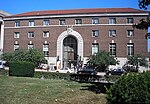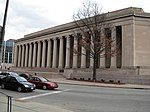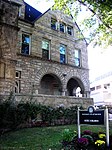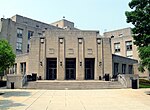The University of Pittsburgh (Pitt) is a public state-related research university in Pittsburgh, Pennsylvania. The university is composed of 17 undergraduate and graduate schools and colleges at its urban Pittsburgh campus, home to the university's central administration and 28,391 undergraduate and graduate students. The 132-acre Pittsburgh campus includes various historic buildings that are part of the Schenley Farms Historic District, most notably its 42-story Gothic revival centerpiece, the Cathedral of Learning. Pitt is a member of the Association of American Universities, a selective group of major research universities in North America, and is classified as an R1 University, meaning that it engages in a very high level of research activity. Pitt was the third-largest recipient of federally sponsored health research funding among U.S. universities in 2018 and it is a major recipient of research funding from the National Institutes of Health. According to the National Science Foundation, Pitt spent $1.0 billion on research and development in 2018, ranking it 14th in the nation. It is the second-largest non-government employer in the Pittsburgh metropolitan area. The university also operates four undergraduate branch campuses in Western Pennsylvania, located in Bradford, Greensburg, Johnstown, and Titusville.
The campus is situated adjacent to the flagship medical facilities of its closely affiliated University of Pittsburgh Medical Center (UPMC) and its flagship hospital, UPMC Presbyterian, as well as the Carnegie Museums of Pittsburgh, Schenley Park, and Carnegie Mellon University.
Pitt traces its roots to the Pittsburgh Academy founded by Hugh Henry Brackenridge in 1787. While the city was still on the edge of the American frontier at the time, Pittsburgh's rapid growth meant that a proper university was soon needed, and Pitt's charter was altered in 1819 to confer university status on it as the Western University of Pennsylvania. After surviving two devastating fires and several relocations, the university moved to its current location in Pittsburgh's Oakland neighborhood, and by act of the state legislature was renamed the University of Pittsburgh in 1908. Pitt was a private institution until 1966, when it became part of the Commonwealth System of Higher Education.
Pitt has produced eight Rhodes Scholars, ten Marshall Scholars, and 297 Fulbright Scholars. Past and present faculty and alumni at Pitt include six Nobel laureates, three Pulitzer Prize winners, three Academy Award winners, various members of the American Academy of Arts and Sciences, seven United States senators, three United States cabinet officials, and five U.S. state governors.
In athletics, Pitt competes in Division I of the NCAA as the Pittsburgh Panthers, primarily as members of the Atlantic Coast Conference. Pitt athletes have received a total of five Olympic medals.










